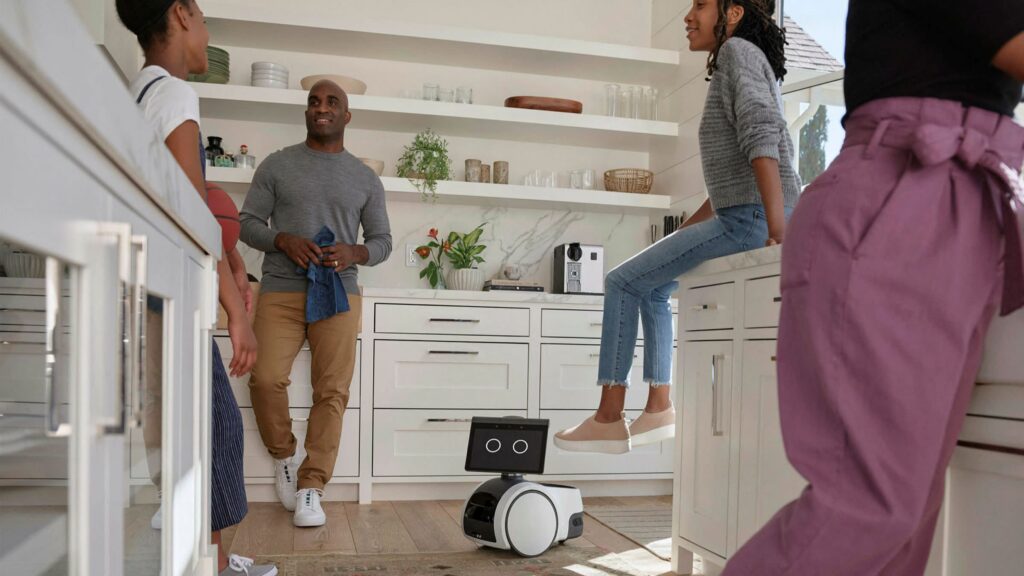Amazon’s Astro robot is a symbol of the surveillance age


Receive free Robotics updates
We’ll send you a myFT Daily Digest email rounding up the latest Robotics news every morning.
When Amazon unveiled a domestic robot this week, it promised that the Astro is capable of “many delightful things”. Tellingly, the first practical example given by Dave Limp, the executive in charge, was checking whether his dogs were cheekily sleeping on the sofa while he was out of the house.
It may indeed be useful to dispatch a robot on wheels remotely to raise its periscope camera and scan for pets behaving badly. But it hardly rivals the superpowers of Astro Boy (originally known as Atom), the android hero of a Japanese manga series from the 1950s and 1960s, when human-like robots felt tantalisingly close.
In 1967, the American novelist and poet Richard Brautigan imagined “a cybernetic ecology where we are free of our labours . . . and all watched over/by machines of loving grace.” Brautigan was prescient about one thing: the task for which Amazon’s robot is best suited is surveillance, loving or not.
There is a well-known Punch cartoon of some Daleks from the BBC television series Dr Who at the foot of a staircase, cursing that their plans to conquer the universe are ruined. This machine suffers from similar limitations: it can navigate apartments but would be stumped by a two-storey house.
Astro’s most human talent is recognising its owners. Amazon has built into the device a screen and artificial intelligence, so that it can identify up to 10 family members, follow them around playing music or videos, blink its digital eyes and carry small items from one to another. In other words, it performs like a well-behaved toddler; it will even go away on command.
Where Astro outperforms the toddler is on sentry duty. It can act like a miniature guard, patrolling while the occupants are out and checking on unexpected noises, such as burglar alarms or breaking windows. If it finds an intruder, it will track him and observe the crime, unless he kicks it over.
Astro is the latest surveillance device arrayed through smart homes, from video doorbells such as Amazon’s Ring and Google’s Nest to static internal cameras. Amazon is starting to sell its Always Home Cam, a drone with a camera that can fly around, taking video clips in each room.
Homes are becoming tiny analogues of China’s smart cities, where cameras connected to AI databases can identify lawbreakers, imposing justice by machine learning. SenseTime, a company specialising in facial recognition and what is called “predictive policing” plans to list publicly in Hong Kong this year.
SenseTime’s software is used to spot drivers without seat belts or using phones and is installed in 119 cities, mostly in China. It helps to be supported by an authoritarian regime that does not care much about privacy: Amazon, IBM and Microsoft have all declared moratoriums on selling their facial recognition software to police forces.
This has not stopped other companies, including Clearview AI, from doing so. A study by the US Government Accountability Office this year found that many security agencies, including the FBI, have been using facial recognition software to match criminal suspects to databases. Some states run searches against photos used on driving licences and voter IDs.
Amazon knows the danger of being associated with a domestic dystopia, having been criticised after US police viewed footage from Ring doorbells (which do not use facial recognition). Astro stores identity data locally rather than in the cloud, and Limp pledged that it had “thought about privacy at every turn” in designing the robot.
But residents want keep an eye on burglars, and they have that right. Most countries put limits on citizens attacking intruders, except in self-defence, but scanning is another matter. Astro and the Nest Doorbell merely register the presence of strangers, rather than identifying them individually, yet that alone can be powerful.
Surveillance need not be sinister. Astro is not RoboCop: it is just a box on wheels with a digital map and an intelligent camera. There are plenty of reasons why observing a home remotely is reassuring. You can check if a stove was left on by mistake, or whether elderly parents far away are up and about as they should be.
It has been a similar story for the Apple Watch, which was initially marketed as a luxury accessory, but turned out to be most compelling as a device for monitoring fitness and health, from the pace of exercise to the beating of a heart. As well as keeping the time, it watches over its owner.
Technology often promises much but turns out to have limited uses, and robots are prime examples. SoftBank suspended production of Pepper, a humanoid robot that is not particularly good at anything, earlier this year. At least Astro has an identifiable role as a watchdog on wheels.
It is not the cybernetic future once imagined by Brautigan and Osamu Tezuka, the Japanese writer and artist behind Astro Boy, but it will put some people’s minds at ease. One day, it may even climb stairs.